Transnational Research Forum gathers academic experts from different disciplinary backgrounds to collectively find solutions that would better serve radicalisation prevention efforts. The need for evidence-based practices in P/CVE appears to be the consensual approach.
One of the difficulties when developing efforts to prevent and counter radicalisation and extremist threats is finding the right approach.
Currently, it’s hard to establish comparative metrics of success due to the heterogeneity of intervention strategies, settings, practitioners’ knowledge and training, among other challenges.
An evidence-based model for evaluating radicalisation prevention and mitigation efforts allows for a systematic assessment of results. This process makes it possible to develop and implement approaches, methods, and tools with proven results. The lack of reliable and broad evaluation methods for P/CVE interventions is at the origin of INDEED Project – Strengthening a comprehensive approach to preventing and counteracting radicalisation based on a universal evidence-based model for evaluation of radicalisation prevention and mitigation.
At the core of INDEED project’s concept is the development of a common language allowing existing research to produce evidence-based results, so needed in the field of P/CVE and deradicalisation.
The initiative taps into the potential of participatory user-based design. It emphasises solution searching through interaction and exchange between academia, practitioners, and policymakers.
This concept was at the centre of the INDEED Research Forum hosted in Brussels (Belgium) on May 24th and 25th.
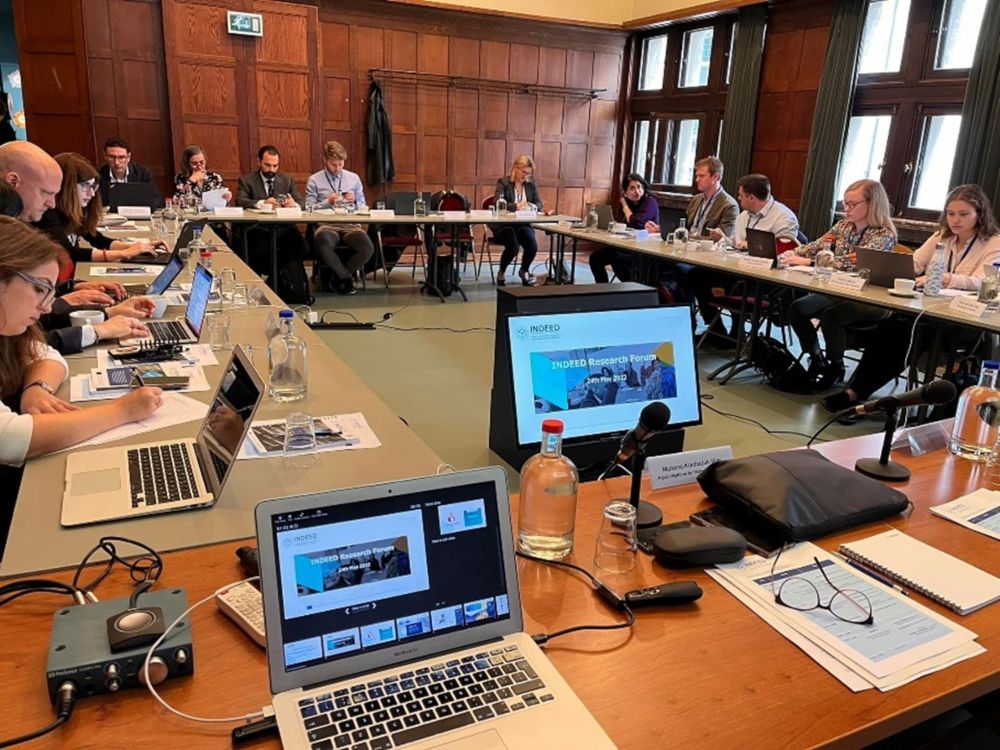
On the agenda was a set of twelve selected questions guiding the expert contributions and discussions, such as:
– What should be the key principles and features of evidence-based practice?
– What counts as evidence? What are appropriate approaches/methods/tools for establishing an “evidence base”?
– How can evaluation results be more systematically collected and synthesised? How can they best feed into creating an “evidence base”?
– How can “evidence” produced by the evaluating programmes and initiatives be more effectively communicated to and utilised by first-line practitioners and policymakers?
Setting the scene: Evidence-based approaches across academic disciplines
To build on a solid foundation, the INDEED Research Forum took stock of the evidence-based movement across academic disciplines.
The main challenges in building evidence systems are growth and quality of research, applicability, replicability and lack of evidence, according to Dr Ciara Keenan, an Evidence synthesis specialist from the Queen’s University Belfast. In her full communication, she provided an overview of the evidence ecosystem and architecture that benefited all participants.
Also contributing to the contextualisation, Jyoti Belur, from University College London, explained how crucial scientific evidence is to identify the expected and desired outcomes of an intervention. We must understand the context, what makes it work, and all the dimensions involved: Who, Whom, What, and How, she added.
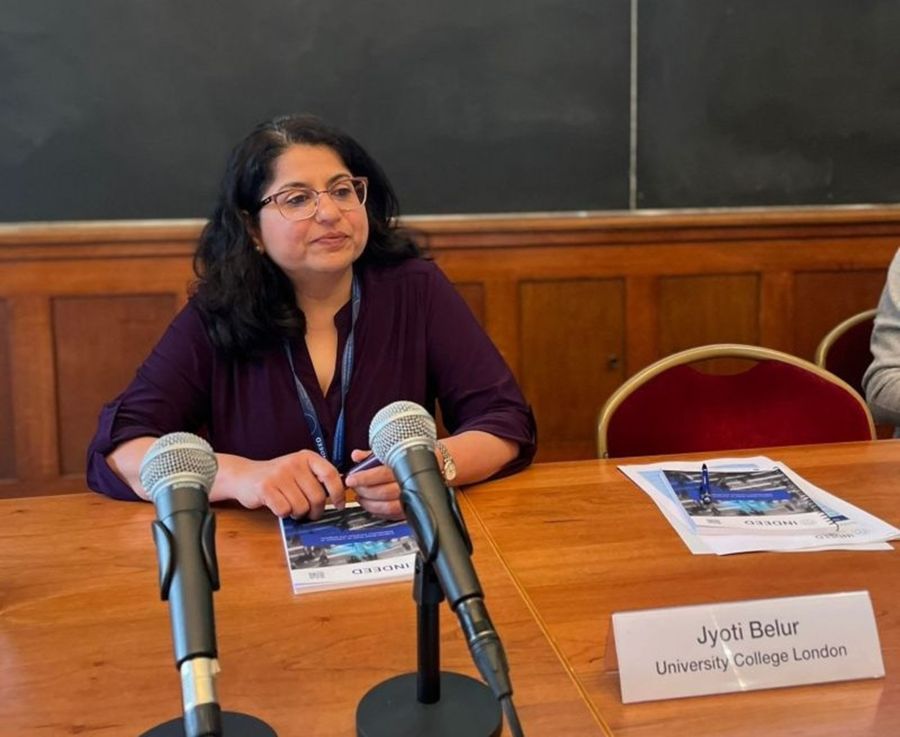
Advances and challenges in evidence-based P/CVE and Deradicalisation
Forum participants analysed the state of the application of evidence-based approaches in the P/CVE field and identified issues to overcome.
“Even though during the last decade there has been a cultural shift towards evidence-based practice among practitioners, policymakers and academics and the collaboration between them has been growing, there is still a long way to go”, said Joel Busher from Coventry University.
Also from Coventry University, Tom Fisher’s opinion is that the state of P/CVE evidence is divergent, piecemeal, systemically critical, and at odds with the policy and practice. This researcher on the impact of academic investigation underlined that practitioners and policymakers must work harder to draw out consensus and be constructive and clear where there is disagreement, divergence, and bias.
An emphasis on the lack of synthesis and absence of explanatory theory was put forward by Sarah Carthy, researcher at Leiden University. For her, these are the main hurdles to implementing evidence-based practice. She stressed the use of robust theories from other disciplines to better consider the adaptability of individual studies to a synthesis. The researcher added that practitioners, where possible, should consult syntheses of evidence instead of individual studies.
Moving Ahead: Strengthening evidence-based practice in radicalisation prevention
Different approaches, methods, and tools to strengthen evidence-based practices were on the table. Participants explored the design and implementation of evaluations and how can they best be applied to P/CVE.
A push towards stronger cooperation is advocated by Teresa Silva from Mid Sweden University: “Evidence-based interventions are produced at the intersection of design science, prevention science and criminology. The role of practitioners and policymakers is essential; it has to be a teamwork”.
“A focus on evaluation is necessary for all phases of the process: during development and implementation, and after the conclusion of the actions and interventions”, says Annelies Pauwels, researcher at the Flemish Peace Institute. The expert highlighted that the practices’ evaluation is essential to strengthening and updating policy. Evaluation allows the detection and mitigation of possible negative consequences, and it is a means to justify allocated human and financial resources.
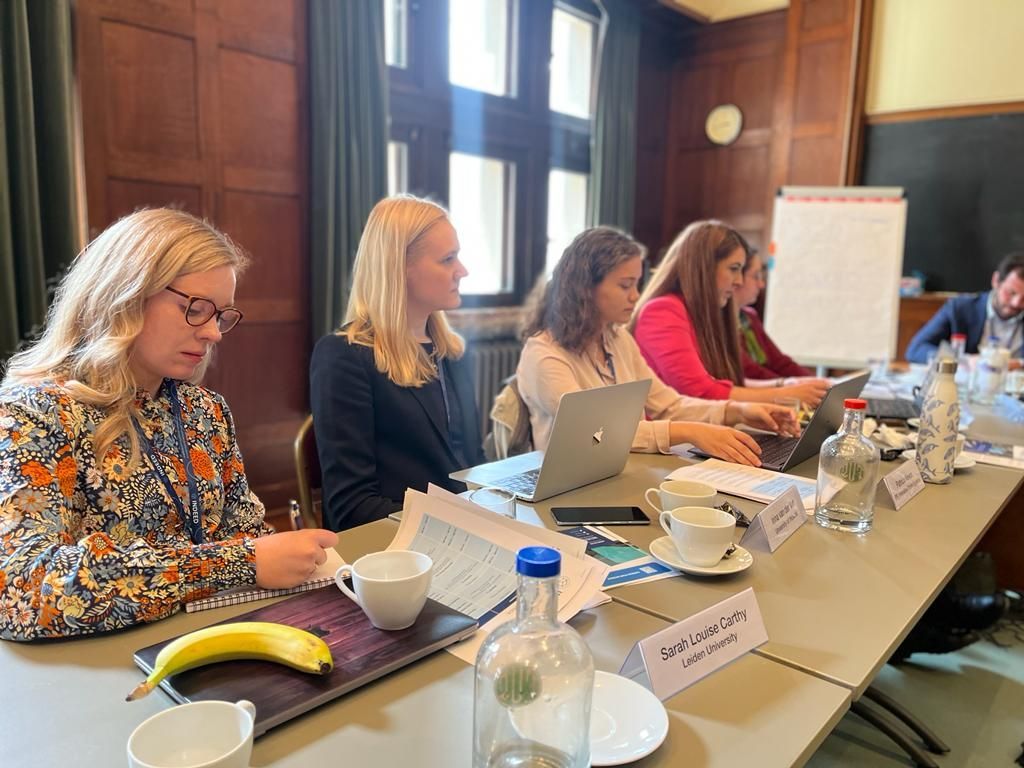
An innovative solution to handle evidence-based data was presented by Antonio Filograna from Engineering Ingegneria Informatica S.p.A. He introduced the DECIDO project.
The mission of DECIDO is to demonstrate the ground-breaking impact of adopting methodologies, tools and analysing data to develop better evidence-based public policies.
The INDEED Research Forum came to completion with a co-design session led by Kai Brand-Jacobsen, President of The Peace Action, Training and Research Institute of Romania (PATRIR). The goal was to collect and discuss the findings from the event among participants.
The results of the Forum discussions will feed into INDEED’s multi-disciplinary review of evidence-based practice. The project’s primary outcome is creating an evidence-based evaluation model to support the field of P/CVE and Deradicalisation.
INDEED project and SMART hubs
The INDEED consortium is committed to raising awareness of the project. Project representatives organised the INDEED Mini-Briefing on May 25th, 2022
Key stakeholders and European Commission representatives were able to get familiar with the project and learn about INDEED’s geographical SMART (Stakeholder Multisectoral Anti-Radicalisation Teams) hubs and how to get involved. The INDEED Network of SMART Hubs brings together policymakers, practitioners, and researchers. They help to identify, analyse, and compare scientifically tested solutions to develop a Universal Evidence-based Evaluation Model and an “INDEED Toolkit” aimed at radicalisation prevention and mitigation.
The meeting was an opportunity to open the conversation and explore areas for cooperation with these strategic stakeholders.
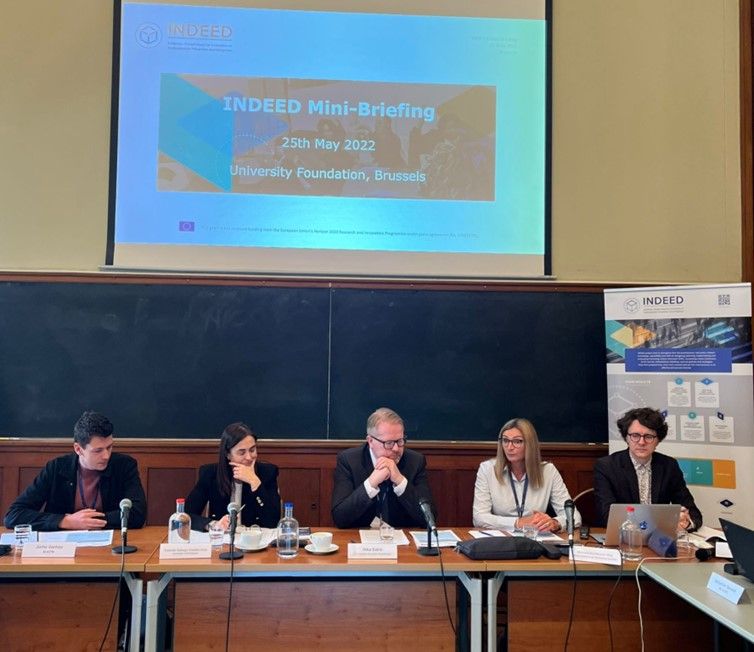
Ilkka Salmi, the EU Counter-Terrorism Coordinator, expressed the importance of unifying and cooperation-based initiatives in P/CVE, highlighting the necessity of information exchange between academia and practitioners.
Representing the EUCPN (European Crime Prevention Network), Jorne Vanhee confirmed the need for INDEED’s evidence-based method: ” We would need a different type of knowledge and evidence to approach the puzzle of crime. We must understand the need for prevention, what the problem is, whom to involve in the designing the prevention measures, how to put actions into practice and what works”. “INDEED and EUCPN could be ‘partners in crime’ prevention”, he concluded.
Finally, Yolanda Gallego-Casilda Grau, from the Prevention of Radicalisation Unit at the European Commission, identified potential synergies with INDEED SMART Hubs: “In December 2021, the EU adopted the Counter-Terrorism Agenda, and one of the pillars focuses on radicalisation prevention. The Agenda foresees the creation of a Knowledge Hub at the EU level that could have a beneficial synergy with the INDEED SMART Hubs”.
INDEED project will continue working on its mission to strengthen the knowledge, skills, and abilities of first-line practitioners and policymakers in deradicalisation and preventing and countering violent extremism.
Know more about this project

INDEED
Strengthening a comprehensive approach to preventing and counteracting radicalisation based on a universal evidence-based model for evaluation of radicalisation prevention and mitigation
To learn more about this European initiative composed of 20 partners from 15 different countries, visit the INDEED website.
Related projects

CEDAR
Continuing Education Against Radicalisation

COOPERHATE
Delivering a comprehensive approach to preventing, reporting, investigating and prosecuting hate crime and hate speech-related incidents in Portugal

DIGIDEM
Fostering Digital Democracy and Citizenship in Higher Education

EUTEx
Developing a European framework for disengagement and reintegration of extremist offenders and radicalised individuals in prison

FUTURE-ART
Sentinels of the Future: Together to Eradicate Human Trafficking

HOPE
Holistic Radicalisation Prevention Initiative (Balkan countries)

IN2PREV
Law enforcement and community cooperation and training approach to prevent radicalisation by ensuring refugees’ successful inclusion

INTEGRA
Integrated Community, Probation and Prison Services Radicalisation Prevention Approach

KOBAN
Identifying future capabilities for Community Policing

MIRAD
Multi-Ideological Radicalisation Assessment towards Disengagement
Related news
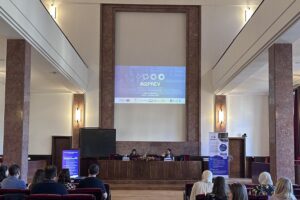
IN2PREV Final Conference highlights cross-sector collaboration for refugee inclusion and radicalisation prevention
Read More »
Standing united against hate: A national effort to prevent and tackle hate crime and hate speech in Portugal
Read More »
New IPS-led initiative unites efforts to protect religious communities, schools, and places of worship
Read More »
IPS contributes to shaping EU’s future agenda on radicalisation prevention at Brussels Town Hall meeting
Read More »
Advancing rehabilitation and countering contemporary extremist threats: IPS at the EU Knowledge Hub on Prevention of Radicalisation Thematic Panels
Read More »



